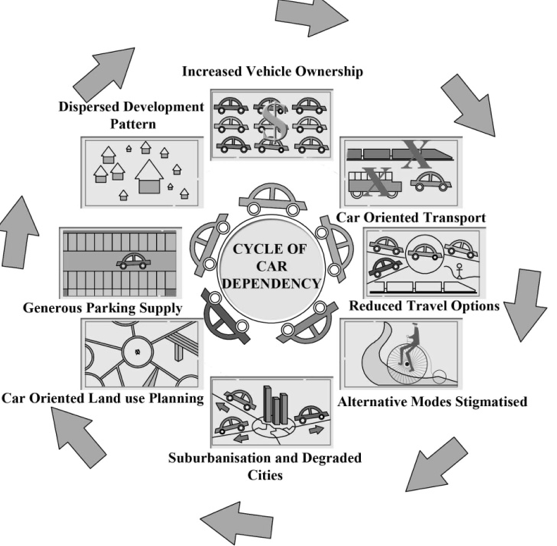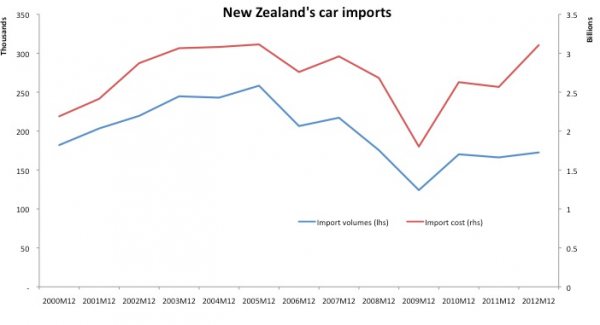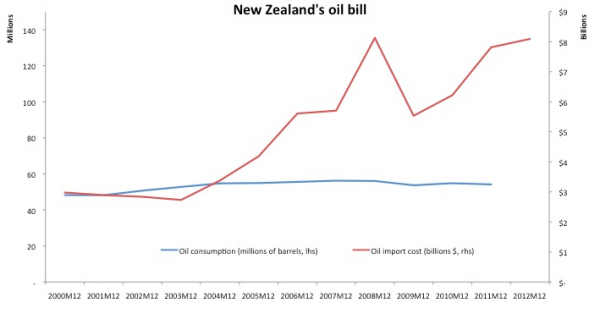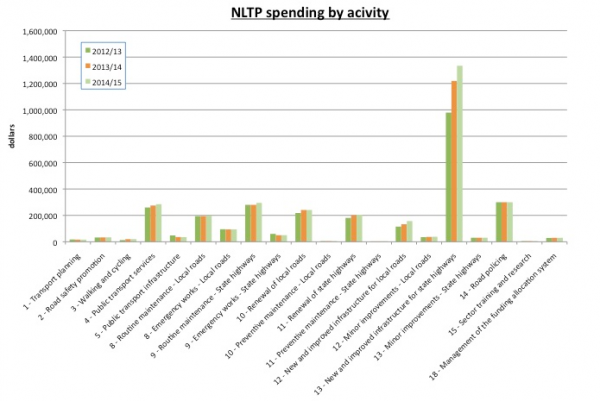As part of our Reconnect Auckland campaign for smart, green transport, I have been giving a talk to numerous community organisations, business associations, high schools, unions and even the Auckland Business forum and trucking associations. (You can watch a short, filmed version here.)
I start with a statement we can all agree on. In Auckland most people have to use a car to get most places.
This state of affairs is known as car-dependency. And it is very costly. I am not even talking about the environmental costs, like greenhouse gas emissions, air and water pollution. Or social costs like road crashes, obesity and related chronic diseases, or reduced access for those who can’t drive.
Local government spends $1billion a year on transport infrastructure. Mostly roads and road maintenance – and of course that comes from our rates. Central government spends $3billion a year, from petrol tax and road user charges, and the vast majority of that is on roads. The largest share, over $1billion a year alone will be spent duplicating a few state highways that carry less than 4% of all daily vehicle trips.
But households and business spend far more than that. Last year we spent $8 billion importing oil, and $3 billion importing vehicles. Another way of looking at is to multiple average annual cost of owning and running a car (about $5,000.) by the 2.3 million cars = $11.5 billion. So, we are having to spend nearly three times as much as government just to use the infrastructure being built with our tax money.
Car dependency is, contrary to popular belief, not the inevitable result of “progress” or people’s preferences. It is not as simple as the catch-phrase “New Zealanders love their cars”. The culprits are not the many motorists who have little better option than to drive. The culprit is not even the road transport lobby, (though they may also be somewhat mistaken about the relative merits of new motorways in reducing congestion.)
The main culprit, is an array of local and central government policy that has reduced people’s choices. We are not at all alone — North America and Australia have high car dependency as well, for similar reasons. Although in the United States, there are obvious private interests that drove these car-oriented policies: the car companies, the tyre companies and the oil companies.
In New Zealand, hardly anyone benefits from transportation and land use policy that is entirely oriented around cars. Those who build and maintain infrastructure would also benefit (perhaps more so) from a people-oriented infrastructure approach. As would households, business, the wider economy, public health, the local environment and the climate. Even, perhaps especially, those who will still use the roads.
This makes transport one of our best avenues for progressive, smart green change. We have everything to gain from reducing car dependency.









In the 1920s car manufacturers, tyre companies and oil companies conspired to remove electric tramways, in order to expand their markets and increase profits. They succeeded.
After WW11 a national transport plan for America was to be formulated; the job was given to General Motors.
Countries that did not have vast reserves of oil followed the same idiotic path.
US extraction of oil peaked in 1970 (just as M King Hubbert said, in 1956, it would). The insanity continued.
The discovery and exploitation of North Sea oil and Alaskan oil got western nations temporarily out of the crap: but now those short term booms are over. So western policy consists now of sending ‘children’ to far away places to steal oil, and printing money to pay for imports, plus desperation attempts to prop things up via short-lived fracking wells. .
The pollution and health aspects have been ignored by governments for decades (not surprising, since governments are now simply the local agents of international corporations, many of which are bigger than most nations ). So now there is an epidemic of various forms of ill- health relating directly to fossil fuel use.
And global emissions of CO2 have already wrecked the jet streams, which is resulting in severe climate instability.
Runaway CO2 emissions trigger positive feedbacks which put humanity on track for Near Term Extinction around 2040.
Will politicians do anything about any of this?
Of course not!
Hey Julie, good article at . Just one major question (one which possibly poses another blog rather than comment):
Since the government has mismanaged transportation to such a gross (*shuddering*) extent. What makes you believe that it is government, and not private enterprise that is best to correct the situation? And I’m talking serious free market shiz, none of this ‘Tony Blair New Labour’ of the government using ‘market’ incentives (PPPs).
As always, much respect,
Phil.
Because the government has worked in the interests of private enterprise for the last few centuries with the last century being somewhat offset by the government actually putting in some minor social policy. In other words, if it was left entirely to private enterprise we’d just have a lot more of the same – More poverty, more roads and less say in how we’re governed. Basically, we’d have the 19th century back.
[…] TRAINSPOTTING: The high cost of car-dependency – Green MP, Julie Anne Genter writes, […]
So will all Green backed candidates in the local body elections be backing the Congestion Free network proposal as a counter to the current Intergrated transport Plan for Auckland?
http://transportblog.co.nz/congestion-free-network/
[…] trying to make it easier to drive at peak time, thereby inducing traffic in the medium term. I blogged last week about the high cost of car dependency and how those were imposed mostly by our own (well meaning) […]
[…] colleague, Jeff Kenworthy, also coined the term automobile dependency, what I have (for shorthand) previously blogged about as car dependence, and published the first comprehensive studies on the […]
[…] cars. Sure – they could be better than petrol cars, for a number of reasons. But I’m all about reducing car dependence, which means focussing on smarter alternatives to cars: for short trips this means safer walking […]
[…] blogged before about the high costs of car dependence and the dubious concept of time travel savings, which sees billion dollar motorways being built for […]
Comments are closed.